N Chandra Mohan
The discourse on poverty in India focuses mostly on its rural dimension because the vast majority of poor come from the countryside.
However, with faster growth since the economic reforms of the 1990s, a slow but persistent urbanisation of poverty - a shift from its concentration in rural to urban areas - has been observed by researchers.
Urban India accounted for 26 per cent of the poor in 2004-05, according to National Sample Survey data.
Economists have also noted that although consumption expenditures have grown faster in urban than rural areas, the post-reform period, 1993-94 to 2004-05, saw a slower pace of urban poverty reduction when compared to the pre-reform period of 1983 to 1993-94.
...
Focus on smaller towns can reduce poverty
Image: There are more poor in smaller towns than big cities."Unpacking" the urban poverty numbers, they systematically found higher poverty ratios in smaller towns (population of less than 50,000) than big cities (one million-plus): in 1983, the poverty ratio was as high as 50 per cent in smaller towns - higher than even rural poverty - when compared to 29 per cent in big cities as against the urban average of 42.3 per cent.
The same picture also obtains in 1993-94 and 2004-05.
...
Focus on smaller towns can reduce poverty
Image: Smaller towns are also leading the fight against poverty.Even if the overall pace of reduction that took place in urban areas was relatively slower than before, the main contributor to this reduction has been small and medium towns rather than big cities.
However, their finding of a higher incidence of poverty in smaller towns, including the changes over time, has been observed by others as well, like Himanshu and Amitabh Kundu of the Jawaharlal Nehru University and Dipak Mazumdar and Sandip Sarkar at the Institute of Human Development in Delhi.
...
Focus on smaller towns can reduce poverty
Image: Manufacturing is moving to smaller towns.Mazumdar and Sarkar say this possibly stems from a trickle-down effect powered by the decentralisation of non-agricultural activities to the smaller towns.
Alternatively, smaller towns might have enjoyed stronger growth during the post-reform period due to commercialisation of agriculture.
Himanshu, for his part, favours a not-so-different explanation in terms of the growing specialisation of activities in urban India.
The bigger cities, thus, appear to be specialising in services, while manufacturing activities are being shifted to the small and medium-sized towns, enabling these to contribute more to poverty reduction.
...
Focus on smaller towns can reduce poverty
Image: Bulk of modern urban poor are living in smaller towns and cities.Their work illustrates that urban consumption growth contributes to growth in the rural non-farm economy, and thereby to rural poverty reduction.
They speculate that the link from urban development to rural poverty reduction might have been stronger if urban poverty reduction had been centred on India's smaller towns and cities.
It is in such small towns and cities that the bulk of the urban poor are concentrated, and these same towns and cities are also more tightly connected to surrounding rural areas.
This pattern has also been observed in urban Brazil.
...
Focus on smaller towns can reduce poverty
Image: Government policies ignore small towns and cities.For instance, the National Rural Employment Guarantee Act and Bharat Nirman have a rural focus, while the National Urban Renewal Mission concentrates on big cities.
Clearly, there appears to be a policy bias towards the provision of infrastructure to metropolises than any effort to target small towns.
Since the urban poor are concentrated more in the small towns, there are strong normative grounds to focus on the latter and also for the instrumental role they play in reducing rural poverty argue Lanjouw and Murgai.
...
Focus on smaller towns can reduce poverty
Image: Unemployment in small towns has gone up.The rate of unemployment on the basis of current daily status - which captures the average volume of unemployment in a day or intermittent unemployment - for males has increased sharply from 7.2 per cent in 1993-94 to 8.7 per cent 2004-05 in the small towns.
...
Focus on smaller towns can reduce poverty
Image: Importance of small town India is perhaps declining.In contrast, joblessness rose less sharply in metros over this period. Isn't it possible that while some of the bigger small towns have reduced poverty, a growing proportion of them at the lower end are also suffering?
In other words, small town India is perhaps declining in relative importance over time.
This writer's doctoral dissertation on Aspects of Dualism in India's Urban Labour Market had argued that smaller towns have indeed witnessed a decay of artisan activity such as handloom weaving, resulting in growing joblessness.

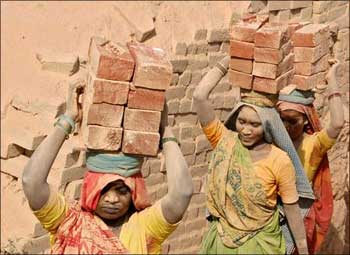
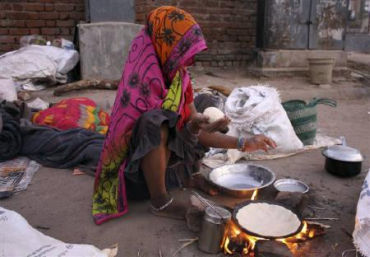
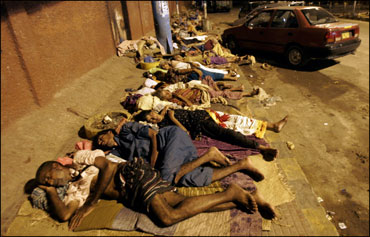
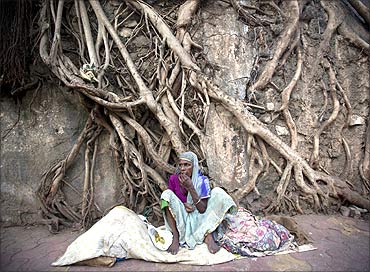

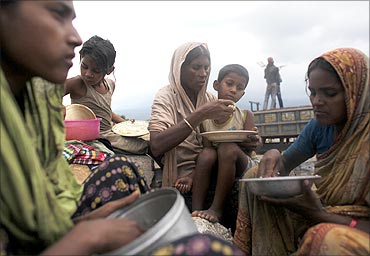

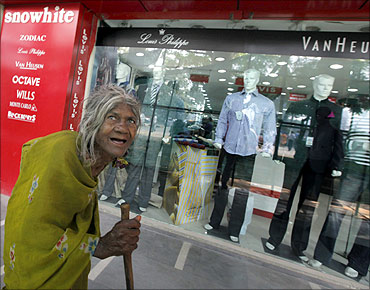

article